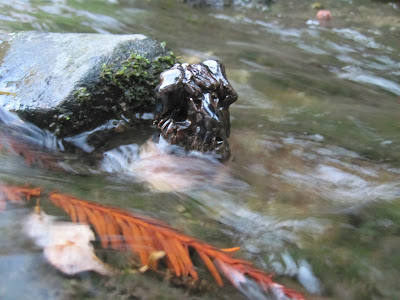Two sonnets from Tennyson:
THE KRAKEN
Below the thunders of the upper deep;
Far, far beneath in the abysmal sea,
His ancient, dreamless, uninvaded sleep
The Kraken sleepeth: faintest sunlights flee
About his shadowy sides: above him swell
Huge sponges of millennial growth and height;
And far away into the sickly light,
From many a wondrous grot and secret cell
Unnumbered and enormous polypi
Winnow with giant arms the slumbering green.
There hath he lain for ages and will lie
Battening upon huge sea-worms in his sleep,
Until the latter fire shall heat the deep;
Then once by man and angels to be seen,
In roaring he shall rise and on the surface die.
--Tennyson
SONNET
She took the dappled partridge flecked with blood,
And in her hand the drooping pheasant bare,
And by his feet she held the woolly hare,
And like a master painting where she stood,
Looked some new goddess of an English wood.
Nor could I find an imperfection there,
Nor blame the wanton act that showed so fair--
To me whatever freak she plays is good.
Hers is the fairest Life that breathes with breath,
And their still plumes and azure eyelids closed
Made quiet Death so beautiful to see
That Death lent grace to Life and Life to Death
And in one image Life and Death reposed,
To make my love an Immortality.
--Tennyson
I've always been intrigued by these two poems. The first offers an apocalyptic vision of a mythic undersea beast that ends only in destruction. A poem of natural wonder, of marine sublimity, ends in an expression of revelatory faith at the end of times. Rapturous, for sure. The second is, to my mind, a moving still-life, intriguing in itself, and yet the title emphasizes form, emphasizes the dynamic relationship of a very English, very constrained poetic structure and the seemingly unpoetic (that is, seemingly unself-conscious) scene it describes via that structure.
I mean, "Sonnet" is obviously self-conscious, but not obviously self-conscious about its own structure. What do I mean? I may be making too much of the title being poetically self-reflexive.
What would Emily Bronte or her Heathcliff say about such a poem?

























